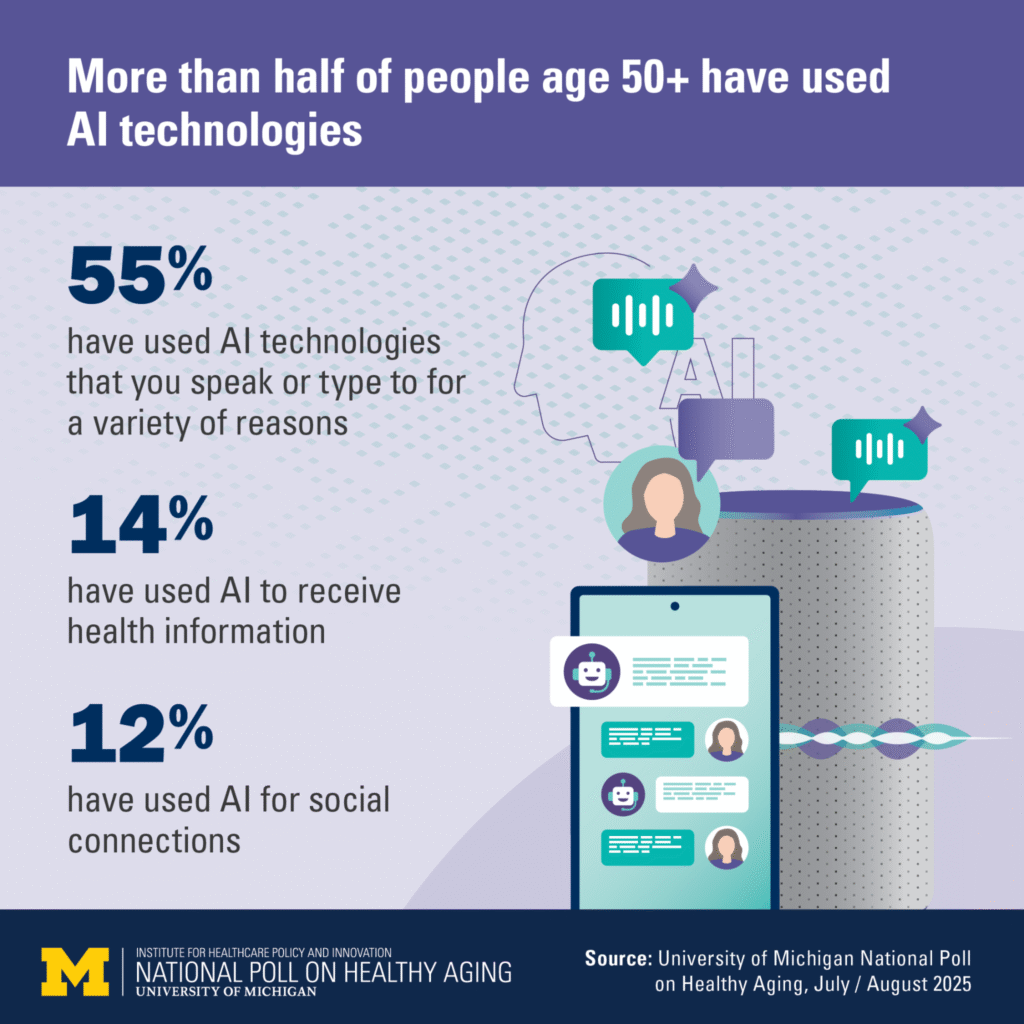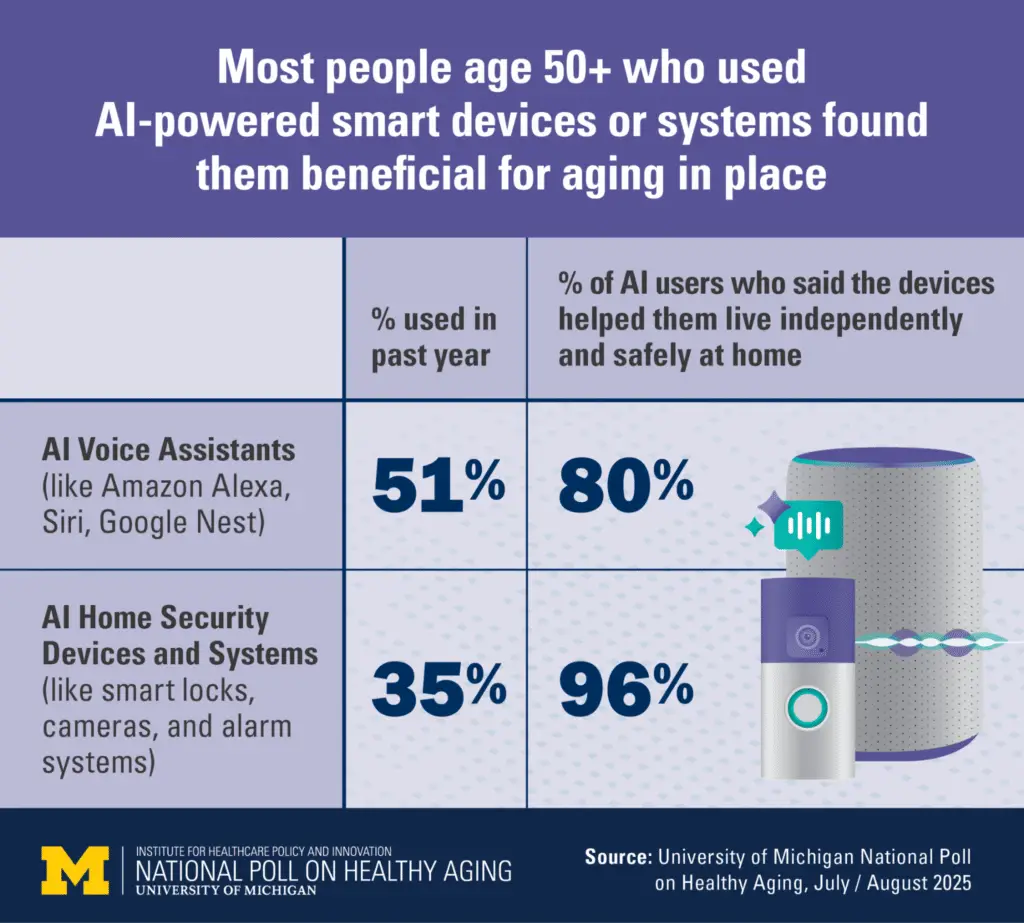U-M study shows seniors engage with AI but remain skeptical, especially on health topics
AI use among older adults, a combination often overlooked, is now in sharp focus following new national survey results from the University of Michigan. While more than half of people over 50 have used artificial intelligence in some form, such as ChatGPT, skepticism, trust issues, and a desire for transparency remain high. The survey highlights the growing importance of understanding AI use among older adults in today’s digital landscape.
Most Over-50 Adults Have Tried AI—But Want to Know When It’s Used

A new report from the University of Michigan National Poll on Healthy Aging reveals that 55% of adults age 50 and older have used AI technologies, such as voice assistants, security devices, or chat-based systems. However, 92% want to know when content is AI-generated, highlighting a sharp demand for transparency.
As AI use among older adults increases, it’s crucial for technologies to address their specific needs and concerns. Ensuring that AI tools are user-friendly and provide clear information will enhance their acceptance.
Conducted by NORC at the University of Chicago, the survey included responses from 2,883 adults ages 50 to 97. While 80% of those using smart speakers say they’re helpful for aging in place, only 14% had used AI for health information. Among those, nearly half preferred human interaction instead.
“This inability to tell verified information from false information…is especially important when it comes to health information,” said Jeffrey Kullgren, poll director and primary care physician at the VA Ann Arbor Healthcare System.
Michigan Health Experts Say AI Benefits Are Clear—But Misinformation Risks Loom Large
Robin Brewer, assistant professor at the U-M School of Information, emphasized that while AI can support healthy aging through smart home tools or non-urgent health queries, it also introduces new risks. Notably, 81% of older adults said they want to better understand those risks, far outpacing the 58% who are interested in AI’s benefits.
Brewer warns that older adults face unique threats from AI misuse, such as voice-based phone scams and “deepfakes.” She called for greater education efforts from healthcare systems, agencies, and tech developers.
In Michigan, the Michigan Health Endowment Fund supported additional analysis of statewide responses. Those Michigan-specific findings are available through U-M’s online dashboard michmed.org/GQkmw, offering localized insights into attitudes and use patterns.
Trust in AI Remains Limited Among Older Americans

We must continue to explore the implications of AI use among older adults, ensuring they receive the support they need.
When asked about trust in AI-generated information, just 4% of older adults expressed strong trust, with 49% saying they had “some” trust, and the rest citing little or none. Those who had used AI were slightly more likely to trust it.
Half of older adults also said they lack confidence in detecting incorrect AI-generated content, such as hallucinated text or manipulated audio and video.
“People with poor physical or mental health were even less confident in their ability to identify misleading AI content,” said Kullgren. That’s an especially troubling gap for older adults, many of whom are managing chronic conditions or seeking critical health information online.
The need for education on AI use among older adults is growing, as many are unaware of the resources available to them.
Lawmakers Respond as States—including Michigan—Push AI Labeling Laws
Poll co-author Brewer noted that state legislatures across the country—including Michigan—have passed or introduced bipartisan bills to regulate AI use, especially in political ads and healthcare settings. A key concern among voters and lawmakers alike is ensuring that AI content is clearly labeled.
This aligns with the poll’s findings that older Americans overwhelmingly want clarity when interacting with AI. “The near-universal interest in clear labeling…should be heeded by policymakers and the AI industry,” Brewer said.
University of Michigan Expands Free AI Education Opportunities
In response to growing public demand, Michigan Online, U-M’s digital education platform, is offering free and paid short courses on AI and tools like ChatGPT. These are open to all and designed to enhance digital literacy and reduce exposure to misinformation.
More courses are in development. Individuals can sign up for updates via Michigan Online.
Read More Interesting Feature Stories From ThumbWind
- Michigan Feature News Stories – Unveiling the diverse and vibrant people, captivating places, and remarkable events that come together to make the Great Lake State unique.
- Strange Political News – A sarcastic take on official news from around the U.S., exploring the absurdities that often arise in the political landscape while providing a humorous perspective on current events and highlighting the quirks of politicians and policies.
- Michigan Hometown News – News and events from Michigan’s Upper Thumb region worth knowing, including local stories, impactful interviews, and updates on community happenings that shape the culture and lifestyle of the area.
Your Turn – Like This, or Hate it – We Want To Hear From You
Please offer an insightful and thoughtful comment. We review each response. Follow us to have other feature stories fill up your email box, or check us out at ThumbWind News.




